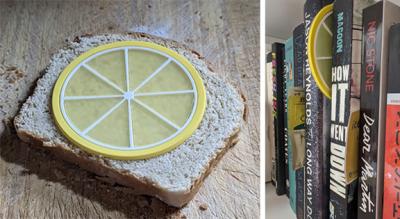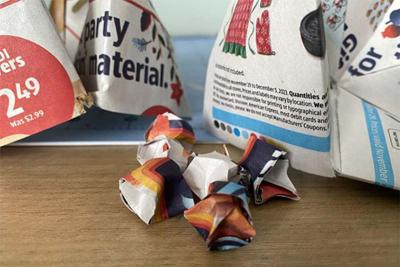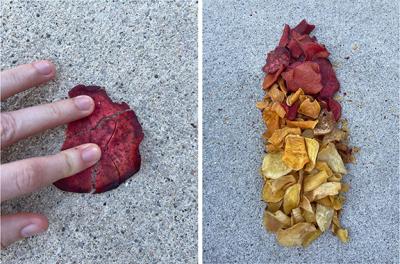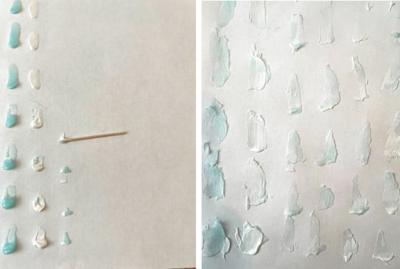Art Educators Explore Play and Artmaking in Online Course
By jt Eisenhauer Richardson, Dorothy Sutton, Molly McDevitt, Stephanie Shieltz-Lowder, and Polina Isurin
In the online course Artmaking and Meaning Making, art educators grow their practice as both artists and teachers. The course invites art educators to explore process-focused artmaking approaches and play strategies that are fun, impactful, and easy to integrate into their teaching. The course explores play strategies developed by Professor Emeritus of Art Education Sydney Walker in her book Art, Play and Meaning Making (Davis Publications, 2021).
This page features four artworks and lesson ideas created by students enrolled in Artmaking and Meaning Making. The artworks capture different ways to foster play, experimentation, and sensory experience in the art classroom.
Play and Everyday Places

When Life Gives You Lemons
By: Dorothy Sutton
About the lesson: How can introducing a photography assignment based on chance help students see everyday objects and spaces in a new light? In this assignment, students select random objects and follow unexpected directions to guide them in creating site-specific compositions during their lunch period and in the library. I began conceptualizing this project by reflecting on the artwork of Gabriel Orozco, Mark Menjivar, and Alberto Aguilar.
I loved getting to experiment and play with materials to envision how I might help my students build their own creativity.
Dorothy Sutton is an ELA teacher at a school in central Ohio. In that capacity, she has piloted a "hidden voices" class, where student explore authors and narrators who deviate from the typical authors and narrators in the American literary canon. Dorothy enjoys time with her spouse and dogs at home as well as time in the garden and with artistic pursuits.
Play and Everyday Actions

Return to Sender
By. Molly McDevitt
Return to Sender is a series of artistic experiments with junk mail I collected for a week. This was a different experience than how I typically handle mail. Usually, I quickly glance through the mail looking for anything important (one or two envelopes) and then leave the rest (most of it) on the floor by my door. I was surprised by what was left after I removed much of the page: bright, small pictures of food, bold red letters announcing “sale” and “free,” and a pile of numbers disconnected from their meaning. It raised questions for me about food insecurity, inflation, and consumerism.
The courses at Ohio State helped me become more reflective in my teaching and more intentional about the lessons I create.
Molly McDevitt is an artist and K-5 art teacher based in Northeast Ohio. She is in her fifth year working in the field where she is passionate about supporting student choice in art making. She is currently pursuing an MA in Art Education from The Ohio State University.
Play and Everyday Materials

Chipping Away
By: Stephanie Shieltz-Lowder
The photograph series Chipping Away captures my interaction with the everyday material of vegetable chips through randomly selected verbs: to gather, to impress, and to erase. The chips left a residue of salt and oil on my hands, which I wiped in the cool, long grass next to the patio when I was finished. The sight, smell, and physical feeling of the beautiful autumn day, combined with the warm colors of the vegetable chips was calming and peaceful. This artmaking process reminded me that every part of your body can be used just like any other art making tool.
I have built connections with other art educators that I know will last a lifetime.
Stephanie Shieltz-Lowder is an art educator for students of all ages in a small district. Her artmaking includes ceramics, drawing, and painting. Her current goal in the MA in Art Education program is learning how to be a better advocate for her students both in and out of the classroom.
Play and Sensory Experiences

Marking the Everyday
By: Polina Isurin
Marking the Everyday explores the experimental and playful possibilities inherent to drawing. I designed this lesson for students with a limited background in art, drawing, or experimental forms of artmaking. I hoped to transition students beyond the notion that drawing requires pencil and paper. The various materials I used for the assignment (toothpaste, condiments, and ice) created an amalgamation of smells in my studio that I didn’t expect. The process reminded me to take notice of the multi-sensory experience that artmaking makes possible when visual representation does not take precedence.
As an artist-teacher, this course helped reaffirm the importance of play, chance, and participation within art curriculum and my art practice.
Polina Isurin is an artist-teacher with experience in museums, schools, organizations, and universities. She has taught visual art courses to middle, high school, and college level students, and is currently completing a PhD in Arts Administration, Education and Policy with a concentration in Art Education at The Ohio State University.
